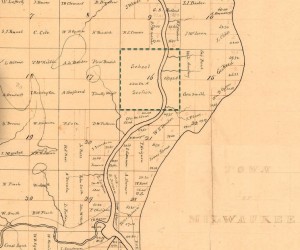 Last year, a total of $32.5 million were distributed to Wisconsin’s public school libraries thanks to a land grant ordinance that predates the United States Constitution. This little known gift from the Confederation Congress has a fascinating history that reflects the high value placed on public education since our nation’s inception.
Last year, a total of $32.5 million were distributed to Wisconsin’s public school libraries thanks to a land grant ordinance that predates the United States Constitution. This little known gift from the Confederation Congress has a fascinating history that reflects the high value placed on public education since our nation’s inception.
The founding fathers believed that public education was the surest way to prepare citizens to exercise the freedoms and responsibilities of our “republican form of government.” As such, the Land Ordinance of 1785 granted every new state one square mile of land within each township (specifically designating “section sixteen” on each township’s newly surveyed thirty-six section plat map) “for the maintenance of public schools . . . .” The sentiment behind this grant was reiterated in the Northwest Ordinance of 1787, which announced that “schools and the means of education shall forever be encouraged.”
Despite their enactment prior to the ratification of the United States Constitution in 1789, these two landmark ordinances continued to govern the process of states’ accession into the Union for many years to come. As such, when Wisconsin was in pursuit of statehood over seventy years later, the Wisconsin Enabling Act contained a provision that the “section numbered sixteen, in every township . . . shall be granted to said state for the use of schools.” This resulted in nearly 1.5 million acres of federal land being handed over to a young State of Wisconsin for the creation of its public school system. Although much of this land was quickly sold to new settlers, Wisconsin’s schoolchildren still enjoy its dividends today.
The Board of Commissioners of Public Lands (comprised of Wisconsin’s Secretary of State, the State Treasurer, and Attorney General) manages the remaining 5,600 acres of state-owned Common School Trust Lands. Primarily located in the northern third of the state, this land generates income through timber sales (totaling almost $26,000 in 2011) and promotes sustainable forestry practices through forest regeneration efforts and invasive species management. All School Trust Lands are also open to the public for hunting, fishing, trapping, and other forms of outdoor recreation. Interestingly, Wisconsin and Mississippi are the only two states east of the Mississippi River to successfully retain any of their original land grant acreage to this day.
In addition to the revenue generated by the remaining School Trust Lands, Article X, section 2 of the Wisconsin Constitution also assigns the proceeds from all fines and forfeitures for the “breach of penal laws” to a trust known as the Common School (a.k.a. public K-12 school) Fund. Wisconsin Statute section 29.934(1) declares that the Common School Fund will further receive eighty-two percent of the remittance from the sale of vehicles, boats, or objects confiscated by the Wisconsin Department of Natural Resources for violations of any law under its authority. Additionally, all proceeds from the state’s sale of other unclaimed property are allocated to this fund. In 2011 alone, the total proceeds from fines, forfeitures, and unclaimed property added approximately $30 million to the Common School Fund.
Wisconsin’s Constitution requires the Common School Fund be used for “the support and maintenance of common schools, in each school district, and the purchase of suitable libraries and apparatus therefor . . . .” Each year, the fund’s earnings are allocated to every K-12 public school district in the state based upon the number of children aged 4 through 20 living therein (the Common School Fund distributions for the 2011-12 school year were $26.54 per child). Wisconsin Statute section 43.70(3) limits the expenditure of the Common School Fund to “the purchase of instructional materials from the state historical society for use in teaching Wisconsin history and for the purchase of library books and other instructional materials for school libraries . . . [including] computers and related software . . . [that] are housed in the school library.” Unfortunately, library staff positions, textbooks, and other materials used exclusively in the classroom are not eligible for these funds under Wisconsin’s current law.
Nonetheless, at a time when budget cuts threaten our ability to finance a healthy public school system, some comfort can still be found in the Common School Fund. If Wisconsin continues to prudently manage this trust, there is every reason to believe that the shelves of Wisconsin’s public school libraries will remain well stocked with books (or their electronic equivalent) for generations to come.
